The Northern Weekly Salvo
Incorporating Slaithwaite Review of Books, Weekly Notices, Sectional Appendices, Tunnel Gazers’ Gazette and Northern Umbrella,etc. Descendant of Teddy Ashton’s Northern Weekly and Th’Bowtun Loominary
Published at 109 Harpers Lane Bolton BL1 6HU email: paul.salveson@myphone.coop
Publications website: www.lancashireloominary.co.uk
No. 297 October 5th 2021
Salveson’s half-nakedly political digest of railwayness, tripe and secessionist nonsense from Up North. Sometimes weekly, usually not; definitely Northern. Read by the highest and lowest officers of state, Whitmanites, weirdos, misfits, steam punks, trespassers, yes women, no men, gay Swedenborgians, cat-spotters, discerning sybarites, bi-guys, non-aligned social democrats, mis-aligned pie-eaters, tripe dressers, nail artists, self-managing VIMTO drinkers, truculent Northerners, grumpy Norwegians, absurd Marxists, sleepy Hungarians, members of the clergy and the toiling masses, generally. All views expressed are my own and usually nobody else’s. Official journal of the Station Cat Improvement Network, Pacer Dining Club, Station Buffet Acceleration Council and the Campaign for a North with a capital ‘N’.
“We are far more united and have far more in common with each other than things that divide us.” – Jo Cox, maiden speech in House of Commons, June 3rd 2015.
General gossips
Grumpy old man writes: We’re in the thick of party conference season, with the Tories ‘up North’ in Manchester while Labour flew south to Brighton. There was the traditional lobby of the Tories though I have to say I don’t really get the politics. ‘Lobbying’ suggests trying to persuade your target audience of something, whereas with the Tories in Manchester the aim seemed to have been to tell them what a load of xxxxxxx they all are. On the other hand, if I was a Tory I’d welcome a bit of noisy sabre-rattling from the Left as it shows the outside world what reasonable people they are, besieged by an aggressive rabble. So why do it? Maybe the one thing it achieves for the Left is creating a sense of camaraderie and mutual support. Personally, I think it’s a pointless exercise that’s probably counter-productive.
Meanwhile, the Labour Conference sounded a dull and disappointing affair. The motion for proportional representation was thrown out despite 80% of the constituency delegates voting for it. Labour’s opportunity to put itself at the head of a democratic reform movement

has been lost, for this year at least. Still, we had Angela Rayner warming the cockles of the comrades by calling Johnson and the Tories ‘scum’. Again, why do this? It cheapens politics and won’t win over a single undecided voter – maybe it will have the opposite effect. Decades ago, Nye Bevan made a big mistake when he referred to the Tories as ‘lower than vermin’. It’s bad, nasty, politics. But I wonder if there’s an element of calculation in Rayner’s apparent outburst? If she can appear to be the ‘radical’ side of Starmer’s Labour it will keep the comrades happy and in line, while Starmer continues to drive his party to the centre-right (and into oblivion, in my view). A bit like the role that John Prescott played in the Blair governments which was so skilfully parodied by Steve Bell in his Guardian cartoons.
It has to be Horwich
You may have seen the press notice from the DfT that a competition has been launched to find a headquarters location for the new ‘Great British Railways’ (GBR). They are looking for somewhere outside London and mention has been made of somewhere with a ‘railway history’.
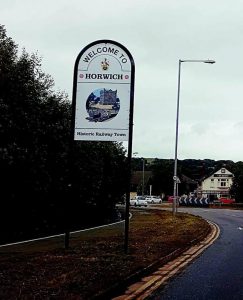
So, why not Horwich? It has a rich railway history – even the road signs entering the town proclaim its railway heritage. There is land available around Horwich Parkway and the station is well served by rail and road, being on an electrified railway and next to the M61. Horwich offers a good quality of life and a range of affordable housing in the area, within easy reach of Manchester.
The press release says: “The government will soon launch a competition by welcoming expressions of interest with a commitment that the national headquarters will be based outside of London – ensuring skilled jobs, investment and economic benefits are focused beyond the capital. The competition will recognise towns and cities with a rich railway history that are strongly linked to the network ensuring the first headquarters will take pride of place at the heart of a new era for Britain’s railways.”
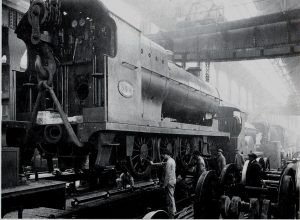
https://www.gov.uk/government/news/new-competition-to-find-first-hq-of-great-british-railways
Great British Railways
Grant Shapps has announced the creation of the GBR Transition Team under the leadership of Andrew Haines, who will continue to work as CEO of Network Rail. The Transition Team will be responsible for driving forward reforms and creating the railway’s new ‘guiding mind’.
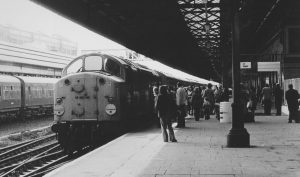
They will initially focus on driving revenue recovery efforts post-pandemic, bringing a whole industry approach to tackling cost and promoting efficiency and establishing a strategic freight unit to boost the sector. Shapps has also set out the core goals that will define GBR, including:
- changing the culture of the railways not simply creating a bigger version of Network Rail
- thinking like our customers, both passengers and freight, and putting them first
- growing the network and getting more people travelling
- making the railways easier to use
- simplifying the sector to do things quicker, driving down costs and being more accountable
- having a can-do, not a can’t do culture
- harnessing the best of the private sector
- playing a critical role in the national shift to net zero
All good stuff, and I have great respect for Andrew Haines. Let’s see how it develops. Andrew will have a critical friend in The Salvo (not quite like The Skibbereen Eagle which warned the Tsar in 1898 that it was keeping its beady eye on him…warning “We will still keep our eye on the Emperor of Russia and on all such despotic enemies, whether at home or abroad, of human progression and man’s natural rights.”
Which way for Labour? Welsh lessons unheeded (so far)
A few months ago I wrote a piece reflecting on the May elections and comparing the success of ‘Welsh Labour’ with the generally uninspiring performance of Labour in England. Yes, yes I know there were exceptions. My argument was that Labour in the North, if it’s serious about winning back support up ‘ere, needs to pull a few tricks out of Mark Drakeford’s copy book. More recently Tribune published an updated version of my article and here’s a summary of it. You can access the Tribune piece at https://tribunemag.co.uk/2021/09/the-case-for-a-northern-labour
………………………………………………………………………………………..
THE LONGER READ: Welsh lessons for Northern Labour
The May elections seem a long way away, and perhaps some of us are doing our best to forget them anyway. But there are some lessons from May 2021 which remain important for Labour in the North. In general, we didn’t do very well, compared with Wales where the results were if anything better than many expected.
The Tories showed little sign of relinquishing their grip on the so-called ‘Red Wall’ towns, with the continuing town/city divide, within the North and other parts of England, remaining strong. A relatively new feature was the emergence of small, ‘hyper-local’ parties, which the London media seems blithely unaware of.
Why Labour did so well in Wales but struggles in the North of England? In some ways, the two places are very different: Wales is a nation with its own history and culture, including language. The North of England is (at least) three regions, with identities revolving round locality and historic counties, such as Yorkshire and Lancashire.
However, there are similarities between Wales and the North of England, particularly in the traditionally working class former industrial areas of Wales: the Valleys in particular, but also the former mining and steel-making areas around Wrexham and North Wales. Whilst these areas mostly voted for ‘Brexit’ it has not stopped them, by and large, remaining with Labour in the Assembly elections. The pattern in similar ‘left-behind’ areas in the North of England has been very different, with swings to either the Tories or ‘hyper-local’ parties in towns such as Bolton, Oldham and Bury.
A number of suggestions have been put forward for why Welsh Labour has done so well. These include the ‘incumbency’ factor and the competent way in which the Labour-run Welsh Government has handled Covid. There is also the historic hatred of the Conservatives in many parts of Wales.
But maybe there is something else. Labour in Wales did not present itself as a sort of local version of Starmer’s Labour, but something distinctly ‘Welsh’: proud of the nation and its heritage, but not aggressively ‘nationalistic’ in a way that might have scared some people – including the large number of English ex-pats in many parts of the country. ‘Welsh Labour’ was clearly seen as something very distinctive, still marking out that ‘clear red water’ between Wales and England which former leader Rhodri Morgan first coined as a metaphor for relations with what was then a Blair-led Labour Party.
Welsh Labour, under the unassuming leadership of Mark Drakeford, comes over as responsible, progressive, in tune and helping shape a ‘green’ agenda and committed to further devolution within a reformed UK. And I’m not entirely sold on the ‘incumbency’ argument – up to a point maybe, but lots of ‘incumbent’ Labour councils in the North of England have taken a hammering. The fact is, a Welsh Labour Government has been seen to be doing a good job.
Up here in the North of England, the politics are very different. Traditional Labour-held councils which once included Bolton have seen further shifts to the Tories or to ‘hyper-local parties’, which should not be written off by Labour as ‘right-wing’ fall-outs from the Brexit party and UKIP.
Yet there’s a counter-movement. Andy Burnham did very well in Greater Manchester. He was able to capitalise on anti-Tory instincts during the Covid situation and earn the title of ‘King of the North’.
So let’s unpick the idea that Labour ‘isn’t for us’ up North a bit more. We are talking about those parts of the North which have historically supported Labour – the Boltons, Oldhams, Blackburns over on this side and the likes of Huddersfield, Bradford, Halifax, Rotherham over on t’other. Not Manchester nor Leeds where Labour wins support from the middle-class professionals and students; and results in Sheffield point to a very different political tradition emerging with the Greens doing well. They’ve now formed a coalition with Labour to run the city.
Labour could rebuild in the North if it was able to forge an identity around class, community and region. Class in the sense that it has to show it is representative of the communities it is part of and speaks their language and understands the issues – including the paramount issue of jobs. Community in that it brings people together and champions local issues and concerns – whether it’s local bus services, developing ‘green spaces’, supporting local culture and heritage or fighting inappropriate development. Region in that it is part of the North, in the way that Labour in Wales has promoted itself as being Welsh but a very inclusive Welshness. Labour in the North of England needs to rebuild its trust with the traditional ‘white’ working class but not ignore its new areas of support amongst BAME communities and amongst middle-class professionals. A shared, inclusive, Northern identity can help do that. Not in any ‘anti-South’ sense but through pride in our heritage and our present-day identity.
This is about more than a bit of clever marketing. Just as Labour in Wales and Scotland have become effectively their own distinct political parties within an overarching UK Labour, we should have our own devolved ‘Northern Labour’ with its own domestic regional policies which include promoting democratic devolution – i.e. elected regional assemblies based on PR. If we continue having to take orders from the London-based Labour HQ, including having candidates as well as policies foisted on us, people will continue to reject us. Does this mean all parts of England should have their own ‘regionalised’ Labour parties? If that’s what the party membership wants, why not? London Labour makes obvious sense and something like it already exists organisationally (www.londonlabour.org.uk), but the same could work for the Midlands, South-west and eastern England.
If Starmer and the Labour leadership really want to win, they need to do that most difficult thing for politicians to do – surrender power. A ‘Northern Labour’ wouldn’t be deciding foreign policy, like whether to invade France or have its own air force. But there are lots of domestic policies that a ‘Northern Region’ within the UK could have responsibility for, and we need look no further than Wales and Scotland to see how that could work. That includes a ‘Northern Railway’ accountable to an elected Northern assembly.
The political expression of Northern devolution must be a devolved political party. It can’t be done by policy wonks in London.
Talks, Walks and Wanderings
Now that Lockdown is sort-of coming to an end, I’m enjoying getting out and about doing talks/lectures. So I’m available to speak to societies, community groups, political parties of all hues and academic organisations. My subject area is eclectic but here are some examples of talks he has given relatively recently (before and after Lockdown!):
- The Lancashire Dialect Writing tradition
- The Railways of the North: yesterday, today and tomorrow
- Allen Clarke (1863-1935) Lancashire’s Romantic Radical
- The Winter Hill Mass Trespass of 1896
- The Rise of Socialism and Co-operation in the North
- The Clarion Cycling Clubs and their Club Houses
- Walt Whitman and his Lancashire Friends
- Forgotten Railways of Lancashire
- Banishing Beeching: The Community Rail Movement
I charge fees that are affordable to the organisation concerned, to fit their budget – so by negotiaton. My preferred geographical location is within 25 miles of Bolton, ideally by train/bus or bike. However, with sufficient notice I can go further afield! Phone 07795 008691 or email paul.salveson@myphone.coop
Publications update from Lancashire Loominary: buy now for Christmas
My new and substantially updated biography of Allen Clarke (Lancashire’s Romantic Radical ) is out and it had a successful launch at Bolton Library’s Lecture Theatre last week. The first edition was 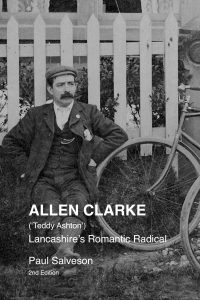 published in 2009 and the new one substantially improves on the original, despite some typos managing to creep in. There’s some additional information about his life and work and an entirely new chapter on his railway writings (‘Teddy Ashton Takes the Train’). There will be an informal event at Bunbury’s Real Ale Bar, 397 Chorley Old Road, on October 19th, from 19.00h. Hopefully there will be a ‘Blackpool Launch’ later in the year.
published in 2009 and the new one substantially improves on the original, despite some typos managing to creep in. There’s some additional information about his life and work and an entirely new chapter on his railway writings (‘Teddy Ashton Takes the Train’). There will be an informal event at Bunbury’s Real Ale Bar, 397 Chorley Old Road, on October 19th, from 19.00h. Hopefully there will be a ‘Blackpool Launch’ later in the year.
I’m doing a special offer on the Allen Clarke book – it will sell at £18.99 in the shops and on Amazon (plus postage) but I’ll do it for £15 with free local delivery c/o Bolton Bicycling Bookshop, or £3 postage in the UK. See www.lancashireloominary.co.uk for details of how to buy it.
I’ve still got some copies of my Moorlands, Memories and Reflections which was published last year and sold pretty well. I want to clear the last 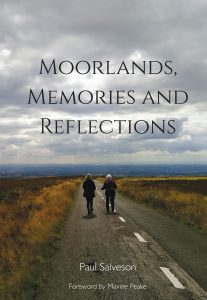 remaining couple of boxes and can do it for £15 (normally £21) to Salvo readers, with £3 postage if not local to Bolton). Have to say, both books make nice Christmas presents! Details on website or just email me and let me know what you want/quantities.
remaining couple of boxes and can do it for £15 (normally £21) to Salvo readers, with £3 postage if not local to Bolton). Have to say, both books make nice Christmas presents! Details on website or just email me and let me know what you want/quantities.
I also have a few copies remaining of The Works, my novel set in Horwich and published two days before the lockdown started. The original price was £12.99 and I’m doing it for Salvo readers at a mates’ rate of £6 (£2 postage). Same applies to With Walt Whitman in Bolton, a nicely illustrated account of a unique chapter in US-British literary history. £6 to you madam.
My photo gallery – a slight emphasis on steam
I’ve been making some changes to my website/s…I’m keeping www.lancashireloominary.co.uk for all publications, including The Salvo. However, www.paulsalveson.org.uk has been re-born as Paul Salveson Photography: places, trains and factories.
There are several pages dealing with different aspects of my photography: BR Steam, Continental Steam, The Modern Railway, Industrial Steam, Northern Rural Landscapes, Mills and Mines, and Strikes, Riots and Demonstrations. This is my current favourite: Industrial Landscapes of Lancashire – Paul Salveson Photography
Good places to buy my books and other things
As lockdown eases, more shops are opening which sell my books. These include Carnforth Bookshop, Wrights’ Reads in Horwich, Pendle Heritage Centre in Barrowford and Kelsall’s in Littleborough. Please support your local bookshops, it’s vital they survive. A great feature of any walk up Rivington Pike is the Pike Snack Shack on

George’s Lane – a long way up, the last place before you get on the track to the summit. You can buy copies of Moorlands, Memories and Reflections and take in the views. Another popular addition to my list of retail outlets is Bunbury’s real ale shop at 397 Chorley Old Road, Bolton. A slightly unconventional outlet is A Small Good Thing, on Church Road. This is a great little shop mainly selling organic fruit and veg and a range of ‘small good things’. Fletcher’s Newsagents on Markland Hill Bolton are stockists. Justicia Fair Trade Shop on Knowsley Street, Bolton, is handy for the town centre and has a full set of my books available (and some great gifts from around the world, ethically sourced).
If you’re local, or passing through, you can call in at 109 Harpers Lane and buy in person – just ring first or email to make sure I’m around (07795 008691).
Obituaries
The last couple of weeks have been a bad time for the loss of some dear friends. Jim Ford, a well-known figure in the community rail world, died following a major heart operation. Margaret Koppens, the driving force behind Halliwell Local History Society, passed away last week. Ian Roden, long-time treasurer of REPTA (Railway Employees’ Public Transport Association) died after a long illness earlier this week. My deepest sympathies to their families and friends.
Small Salvoes
- A very successful seminar/workshop was held at Irlam Station on October 1st. The purpose was to look at prospects for a new community rail partnership covering the two main routes between Manchester and Liverpool – the former ‘Cheshire Lines’ route via Irlam and Warrington and the original ‘Stephenson’ line via Newton-le-Willows. Paul Dennett, the Mayor of Salford, spoke very well, complemented by his deputy and longstanding transport advocate Roger Jones. There was general agreement to take forward the CRP project.
- Rochdale and Calderdale Councils have got together to lay the foundations of a CRP for the Calder Valley Line. They are advertising a job and details are here: or the Calder Valley Line Community Rail Partnership: Community Rail Partnership Officer | Job Details | greater jobs They have also published some information about the Calder Valley Line CRP on the council’s web site, including the CRP’s Prospectus: The Calder Valley Line Community Rail Partnership (rochdale.gov.uk)
- After the success of the film events at Bolton station’s Platform 5 Gallery last week (as part of Bolton Film Festival) there’s more to come. On Wednesday October 13th we will be screening Anthony Dolan’s ‘The French Girl, the Engine Driver and her German Lover’ – set at the time of the Second World War and based on a true story. Most of the film is set in the Tebay/Shap area and is a moving love story. It’s also ‘steamy’ in a railway sense with footplate images. Several of the actors are Bolton-based, and they’ll be joining us at this Bolton/world premiere! It starts at 7.00pm, doors open at 6.45. It’s free but copies of the film will be on sale for £5.
- The Working Class Movement Library has re-started its regular programme of free lectures. For details see wcml.org.uk
- The Edgworth Folk Festival, last weekend, was well supported with some great performers.
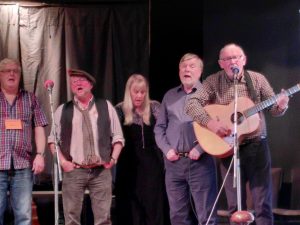 We had a very enjoyable Sunday afternoon at the historic Barlow listening to Sid Calderbank and Mark Dowding, Corrie Shelley, Nick Dow and the superb Caffrey, McGurk Madge (see pic). Well done all, and great to meet up with former next door neighbour Kath!
We had a very enjoyable Sunday afternoon at the historic Barlow listening to Sid Calderbank and Mark Dowding, Corrie Shelley, Nick Dow and the superb Caffrey, McGurk Madge (see pic). Well done all, and great to meet up with former next door neighbour Kath! - Plans are underway for a ‘live’ conference by the Hannah Mitchell Foundation, the cross-party campaign for Northern devolution and democracy. The subject will be prospects for Northern devolution; the day will also include the Foundation’s AGM. The date is Saturday December 4th, Friends Meeting House, Manchester. Details will be posted on HMF’s recently-updated website: www.hannah-mitchell.org.uk
Crank Quiz: New Towns and old streets
Thanks for all of you who responded to the last Crank Quiz on new towns. Unfortunately, the ‘comments’ seem to have got lost. I’m sure they’ll turn up but it might be as well to email your responses for the next few quizzes. They seem strangely popular. So, this one also has a ‘sense of place’ and relates to street and road names with railway connotations. It’s a cunning one, not so easy to google. Top prize for a road name with a shed code! Automatically excluded are any names/roads that are just ‘Railway’ or ‘Station’, but beyond that the field is open.
……………………………………………………………………………………………………………..
Special Traffic Notices: Coming Events
Wednesday October 13th: The French Girl, the Engine Driver and her German Lover: Bolton Station Platform 5 Gallery, 18.45. Guest appearances by ‘French Girl’ and ‘Engine Driver’.
Tuesday October 19th: ‘Allen Clarke’s Bolton’: Bunbury’s Real Ale Bar, 397 Chorley Old Road, Bolton at 19.00
Tuesday November 16th: ‘Winter Hill: then, now and the future’ 19.00 Ainsworth Arms, Halliwell Road, Bolton. Nigel Coates’ film about Winter Hill, with speaker from Woodland Trust.
Saturday December 4th: Hannah Mitchell Foundation Conference and AGM, Manchester. See www.hannah-mitchell.org.uk
Saturday December 11th: Salvo speaking at Railway and Canal Historical Society, Friends Meeting House Manchester at 14.00. Subject: Lancashire’s Railways: a cultural perspective
……………………………………………………………………………………………………
The Salvo Publications List – see www.lancashireloominary.co.uk
The following are all available from The Salvo Publishing HQ, here at 109 Harpers Lane, Bolton BL1 6HU. Cheques should be made out to ‘Paul Salveson’ though you can send cash if you like but don’t expect any change. 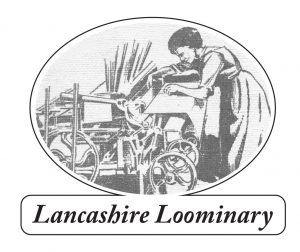 Bottles of whisky, old bound volumes of Railway Magazine, number-plates etc. by negotiation. If you are local you are welcome to call round and pick books up at the door, or the Bolton Bicycling Bookshop can deliver to yours.
Bottles of whisky, old bound volumes of Railway Magazine, number-plates etc. by negotiation. If you are local you are welcome to call round and pick books up at the door, or the Bolton Bicycling Bookshop can deliver to yours.
Allen Clarke/Teddy Ashton – Lancashire’s Romantic Radical (NEW!). The story of Lancashire’s errant genius – cyclist, philosopher, unsuccessful politician, amazingly popular dialect writer. This book outlines the life and writings of one of Lancashire’s most prolific – and interesting – writers. Allen Clarke (1863-1935) was the son of mill workers and began work in the mill himself at the age of 11. Special offer of £15 plus free local delivery or £3 postage to Salvo readers
Moorlands, Memories and Reflections (2020) A hundred years ago Lancashire writer Allen Clarke published a forgotten masterpiece – Moorlands and Memories, sub-titled ‘rambles and rides in the fair places of Steam-Engine Land’. Clarke’s biographer, Professor Paul Salveson, has published a new book celebrating Clarke’s original and bringing the story of Lancashire’s moorland heritage up to date. Maxine Peake, in her foreword to Paul’s book, says “Hill walking, cycling, literature, philosophy, protest and The North…. these are a few of my favourite things.” She adds “Paul Salveson’s new book on Allen Clarke is irresistible.” Special offer £15 for Salvo readers – see the website for details of how to buy: http://lancashireloominary.co.uk/index.html/order-form
The Works (2020). My first novel , set in Horwich and Bolton in the 1970s and 1980s but bringing the story up to the present and beyond. 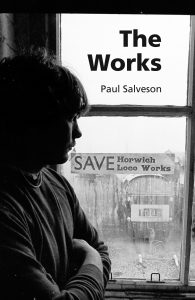 Much of the action takes place in Horwich Loco Works and the campaign to save it from closure. In real life, it closed down in 1983. In the novel, after a workers’ occupation it is run as a co-operative, building both steam for heritage railways and modern eco-friendly trains for the world market. Price £6 (special offer). Also on Kindle £4.99.
Much of the action takes place in Horwich Loco Works and the campaign to save it from closure. In real life, it closed down in 1983. In the novel, after a workers’ occupation it is run as a co-operative, building both steam for heritage railways and modern eco-friendly trains for the world market. Price £6 (special offer). Also on Kindle £4.99.
With Walt Whitman in Bolton – Lancashire’s Links to Walt Whitman This charts the remarkable story of Bolton’s long-lasting links to America’s great poet. Bolton’s links with the great American poet Walt Whitman make up one of the most fascinating footnotes in literary history. 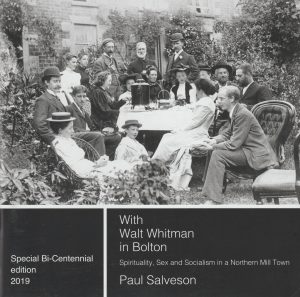 From the 1880s a small group of Boltonians began a correspondence with Whitman and two (John Johnston and J W Wallace) visited the poet in America. Special offer £6 plus postage if you’re not local.
From the 1880s a small group of Boltonians began a correspondence with Whitman and two (John Johnston and J W Wallace) visited the poet in America. Special offer £6 plus postage if you’re not local.
The Settle-Carlisle Railway (2019) published by Crowood and available in most bookshops price £24. It’s a general history of the railway, bringing it up to date. It includes a chapter on the author’s time as a goods guard on the line, when he was based at Blackburn in the 1970s. The book includes a guide to the line, from Leeds to Carlisle. Some previously-unused sources helped to give the book a stronger ‘social’ dimension, including the columns of the LMS staff magazine in the 1920s. ISBN 978-1-78500-637-1
You can get a better idea from going to my website: http://www.lancashireloominary.co.uk
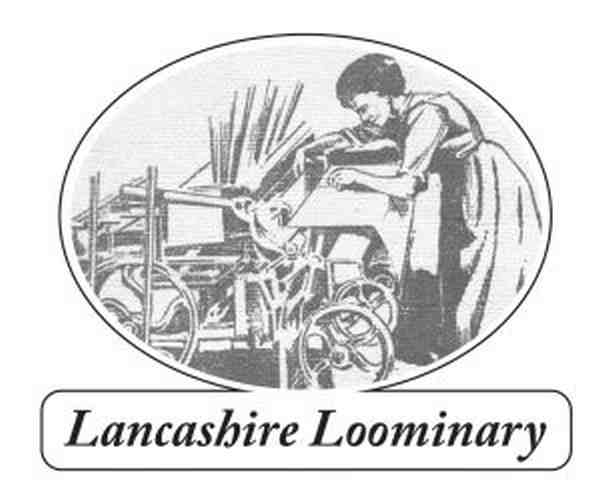
5 replies on “Northern Weekly Salvo 297”
Raynor is to Starmer what Prescott was to Blair. Someone to con the members that working class people are being represented. In fact they are not. Raynor, like Prescott is a stooge of right wing Labour.
Crank Quiz – TIB Street Manchester, Camden shed’s in there. So, DIAGONAL in Barcelona will have Willesden, or must they be at the beginning of the word. Just a thought. Noel
Railway and economic geography dictates that the new headquarters for GB Railways should be at a point where a radial main line from London crosses a major cross-country route, thus giving direct links to as many places on the network as possible. Add in railway heritage and an existing pool of railway talent, and the obvious answer is Derby. If that then encourages the resumption of Midland Main Line electrification, and better local services from Matlock and Crewe, etc, so much the better.
(And no, I’m not biased, as I now live over 100 miles away from Derby!)
‘Great British Railways’ ? That’s awful, sounds like something from the 1950s. It should be ‘Rail Britannia’ in my opinion.
Vernon Sidlow, Horwich.
Although Grant Shapps may want more of a ‘can-do’ attitude on the railways, perhaps half the problem is far too much of such an attitude.
Examples in recent years include :
* we CAN make the May 2018 Northern and Trans-pennine timetables work
* we CAN make the May 2018 GTR timetable work
* we CAN open Crossrail in December 2018
All these occurred because of hard-working, talented people trying their damnedest to bring a project in on time successfully, perhaps against their better judgment. Any attempts to report concerns up the chain would generally have got the response ‘Don’t be so negative’.
More recently , someone has had the courage to say ‘we CAN’T implement the new ECML timetable in May 2022’. It’s just a shame that this wasn’t recognised earlier.
This is by no means just a railway problem (the Challenger Space Shuttle is another example), but just saying ‘we can do’ doesn’t make it happen.